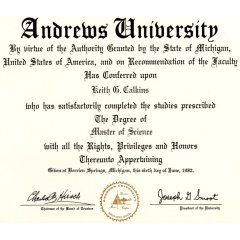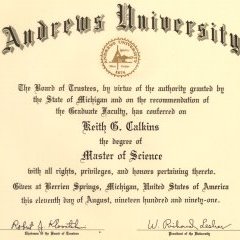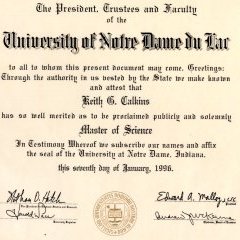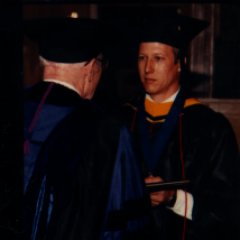



|

|

| ||||||
| MS AU Comp. Info. Sci. | MS AU Math & Physics | MS ND Physics |
Rumor was Shinzo Amigi barely beat me in sophomore calculus or rather math checked with physics first to "even out" the awards. Considering how I did in freshman calculus, this was quite an accomplishment!
The physics/math major story deserves retelling. All my life I was told I would be a math major, never really knowing what I would do with it. My sophomore year I took almost no general education, but rather: sophomore calculus, physics for scientists and engineers, organic chemistry, (having CLEPped out of general! made that real tough) statistics (two quarters, winter and spring), and Data Structures (spring). I took communication skills in the fall, and some other heavy, but always an overload. In fact, in the spring it was 21 credits and two course conflicts. Stat meet M-Th at 2:30 and physics lab started Mondays at 2:30. I ran the paperwork through for math/physics/Ford (dean), and Shwartz (VP) and stayed Monday long enough for the quiz. What blew Terry and Dan away was how I kept beating them on the Tuesday quiz--prepping with their notes beforehand. Of course, I had to study from the book as well--I don't think they did nearly so carefully! In the spring, data structures met M-Th at 9:30? and sophomore calculus met MWF also at 9:30?. Hence I missed data structures (got to keep my priorities straight) two days a week. (I was nonetheless there the Monday Botten started class by saying "I did a little thinking over the weekend" to which I very audibly replied "That's good". Everyone thought the chalk he was fondling was going to be projected in my direction--he was rather agitated by the remark! The trick to getting the overloads approved hinged on taking one of the classes as honors audit. Honors audit had the advantage you did not have to pay for it (whereas regular audit you did). There was an asymmetry then between changing a course from audit to credit and from credit to audit. The former could be done up to about two weeks before the end of the quarter, whereas the later could only be done during the first few weeks of the quarter. It took me ten trips to Dwain Ford's office to get my 21 credit approved--and then only after his annotating that the material for Data Structures had been substantially learned on the job in the computing center during the past year. They had just had a real accreditation crisis because of similar overloads being allowed in one of the African affiliates. A couple real jokers in the situation were 1) the fact that that quarter it was organic chemistry I had chosen to audit--the subject Dwain Ford had taught and later went back to teaching; and 2) that was the first quarter I got all A's (not even an A-!). Dwain Ford said he thought this was an abuse of the audit to credit system and vowed he would have that asymmetry changed. The next year and to this date you cannot change from audit to credit after the first few weeks of the quarter.
The story is not yet over. I spent my junior year at Bogenhofen which gave me a lot of my general education requirements but nothing toward a major. It gave me lots of time to ponder and I decided to change my major to physics. Degrees at that time in computers were either engineering or information science related. Perhaps if they had a computer science option I would have opted that direction instead, (but that comes later). My sister Alice tells of a letter I wrote her that year very logically outlining my decision. Upon return to AU I took an honors independent study in computer science on Mill (9 Men's Morris) that summer and resumed work in the computing center. It was an interesting experience resuming work there. I would sit at the computer terminal and my conscious mind had no idea what to do, but my fingers could start doing the right thing subconsciously. One of the early jobs was some data analysis for Bill Garber. Other staff was on vacation so I picked up in the middle of it. As I was giving him the results, I noted means and standard deviations of about 9 when the data was 1 through 5, so had to rerun it. Missing data had been coded as 99! Many of the tricks I used that summer programming Mill I figured out while at Bogenhofen. They involved clever application of the CVA (convert via addition) instruction to count bits or find patterns. Obviously this was done in assembly. Bruce Ferris (The Kid, TK, or T) had been full-time systems programmer from about Aug. 1976 until Aug. 1977. Dan Bidwell picked up in Aug. 1977. By fall he had a job offer pending from the Lake Union which FINALLY came through in Dec. 1978. By then he had recommended me and I took it immediately. My work with Mill was a contributing factor. That fall started my first senior year. It also was the start of my major physics classes. I took 14 credits of physics (theoretical mechanics, relativity, biochemistry and electronics for Scientists. The electronics for Scientists had one other student who was named Ron Johnson. The teacher was Ron Johnson. These were both different from the Ron Johnson I had graduated from academy with. Biochemistry was from Dr. Kootsey who reenters the story spring 1993.
After starting work full-time, I kept my student loan ($2500 to go to Bogenhofen--actually, Bogenhofen cost less, as much less as I would have earned!) at bay by keeping half time student status. This required taking 6 credits or more, but the classes I needed seemed to come in 4 credit chunks. (Another aside, they told me in the spring of my sophomore year I could not work anymore because of some student aid restriction. I had them recalculate that noting the extra charges due to my overloads. I also decided to exercise the option of getting the five history credits I had CLEPped.) Generally this was one physics class and one general education course. After three senior years not graduating, I was 7 credits short of graduating with a double major with honors. Spring of 1981 they offered to pay for M.S. degreess in the new computer science program, but I needed the B.S. degree to get started. Late May/early June 1981 I filled out 4 petitions to handle various exceptions and submitted the paperwork to Merlene Ogden, dean. (Terri had spent the summer of 1980 with Merlene on the European tour). It was a Wednesday just before graduation. She asked if I had to graduate in June, as if it really were possible, but I assured her timing was not an issue and she seemed rather relieved.

|

| ||||
| Receiving MS#2 | With the family |